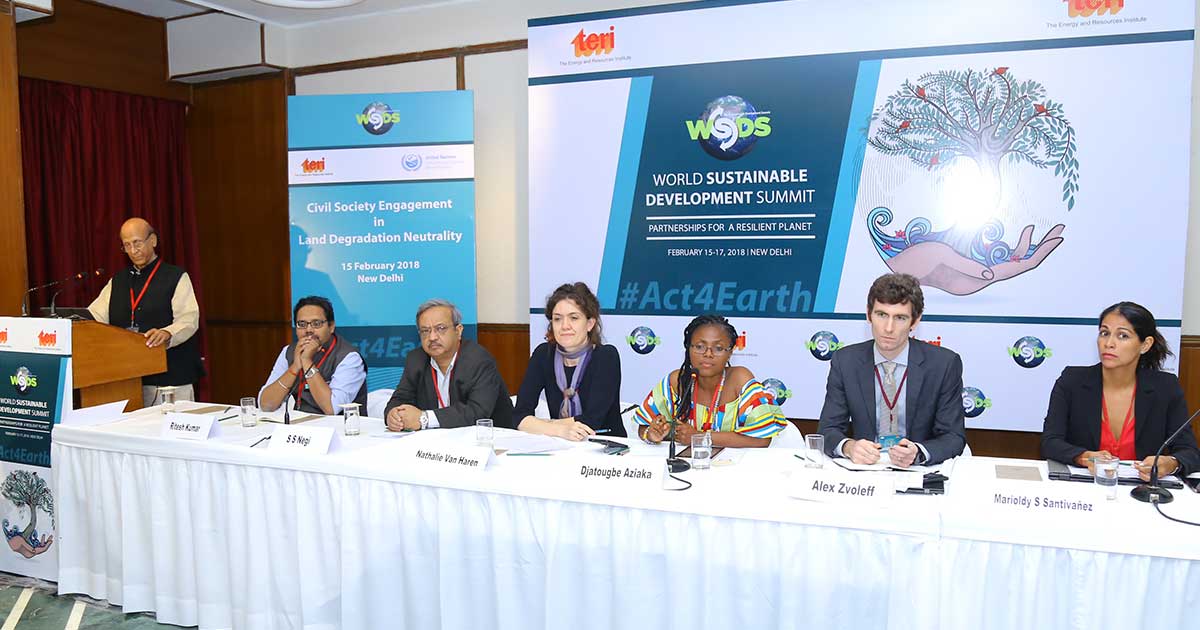
Towards Sustainable Land Management
 Panelists advocating for the cause of sustainable land management to prevent land degradation
Panelists advocating for the cause of sustainable land management to prevent land degradation
Sustainable land management depends on creating a rights-based approach where building synergies with key stakeholders is a critical component. Discussing Land Degradation Neutrality at WSDS 2018 were Dr Alex Zvoleff, Data Science, Moore Centre for Science, Conservation International;
Ms Nathalie Van Haren, Cluster Coordinator, Land Both Ends, Netherlands; Ms Hindou Ibrahim, Coordinator, Association for Indigenous Women and Peoples of Chad; Ms Marioldy Sanchez Santivafez, Project Coordinator, AIDER, Peru; S S Negi, VC, Uttarakhand Vilage Development and Migration Commission; Bhavani Shankar Kusum, ED, Gram Bharti Samiti; and Mr Ritesh Kumar, Director, Wetlands International.
Sustainable Land and Migration Issues
Land degradation and rural migration are closely linked. The problem of migration is closely linked to the problem of land degradation. Abandoned lands interspersed with farmlands is a problem disturbing the entire ecosystem. Low earnings from agriculture and low employment opportunities leads to abandoned wastelands and attacks by wild animals on productive lands. While this is a major issue in Uttarakhand, the advantage is that there is a strong civil society network across the state. Civil society organizations (CSOs) in Uttarakhand work more with women and build the capacity of government staff and communities.
“There is a need to document best practices, recognize the link between land degradation and rural migration as well as build greater collaboration between government and civil society,” said S S Negi, VC, Uttarakhand Village Development and Migration Commission.
Investments in Small Farming and Improving Access to Information
Today the livelihoods of 2 billion people are at stake due to land degradation and drought. One of the key solutions lies in improving access to information by distilling information and making it broadly available to the Government, CSOs and smaller projects for effective planning and formulation of policies. In addition, working with small holders, using right tools to support planning and implementation of LDN, and community-based initiatives are crucial. Groups or movements need to be supported through connections, support from government and national bodies, creating enabling policy environments, taking away the drivers and factors responsible and enabling systems for these initiatives.
Access to information, investments in farmers and working with CSOs – all have a unique role in land degradation neutrality and partnerships are key to achieve this, said Dr Alex Zvoleff, Data Science, Moore Centre for Science, Conservation International.
Close Links between Land and Water/Wetlands Crucial to the Discourse
Drawing the panel’s attention to wetlands, Mr Ritesh Kumar, Director, Wetlands International, said conservation that does not contribute to development of people is meaningless. “We have to connect the dots and look at wetland conservation as a key issue. Just as water for WASH will come from wetlands, waste from land will get deposited in the wetlands. So, wetlands and water are synonymous with land degradation.” According to Mr Kumar, civil society can heighten understanding and play a meaningful role by linking the developmental agenda with restoration solutions. A governance approach is also critical and CSOs would be the harbinger of change as a major part of hope for wetlands in future.
Ground Level Challenges and Solutions
According to panelists, deforestation, unregulated commercial development, overgrazing of cattle, depletion of soil nutrients due to poor farming practices, and natural disasters are key reasons for land degradation. Plugging of gullies and ravines, harvesting rain water, restoring and renovating step wells, were key activities to counter land erosion. The major outcomes included planting of trees, solved the problem of fuel and water, rainwater harvested, training of youths on environment issues, and empowering women and involving them in the process of local activities.